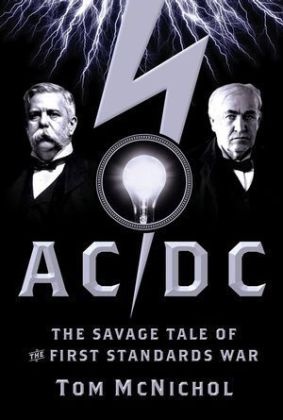Ulteriori informazioni
Informationen zum Autor TOM MCNICHOL is a contributing editor for Wired magazine. His articles have appeared in the New York Times, Salon, the Washington Post, and the Guardian. His radio commentaries and satires have aired on NPR's All Things Considered, Morning Edition, and Marketplace. He's the author of Barking at Prozac (Crown Publishing, 1997), and his work appears in the anthology Afterwords: Stories and Reports from 9/11 and Beyond (Washington Square Press, 2002). Klappentext Praise for AC/DC"You'll never look at your wall socket the same again."--Evan Ratliff, coauthor, Safe: The Race to Protect Ourselves in a Newly Dangerous World"From the twisted copper wires of electricity's early years McNichol spins a story buzzing with genius and fraud, ambition and infamy, hilarity and humiliation. It's a joy to read: a comic operetta of American industrial history, full of great men, small minds and an alarming number of dead dogs."--Craig Stoltz, health editor, Washington Post"Few writers explain technology as well as Tom McNichol. No one's as good at finding the humor in it."--Jeffrey O'Brien, senior editor, Wired magazine"A fascinating history of the battle that decided what comes through the wires when we flick a switch. A great story of how far people will go to prove they're 'right' - and make a buck."--J. J. Yore, executive producer, public radio's Marketplace"A tale of astonishing genius and greed, a perfect reflection of the competing forces that built corporate America. McNichol offers us a ringside seat at the birth of a superpower, and it's a bloody, messy, and altogether fascinating spectacle."--Brooke Gladstone, cohost, NPR's On the Media Zusammenfassung This is the story of how Thomas Edison bet wrong in the fierce war between supporters of alternating current (AC) and direct current (DC). The savagery of this electrical battle can be hardly imagined today. AC/DC is an object lesson in bad business strategy and poor decision making. Inhaltsverzeichnis Prologue Negative and Positive 1 1 First Sparks 5 2 Lightning in a Bottle 13 3 Enter the Wizard 25 4 Let There Be Light 41 5 Electrifying the Big Apple 55 6 Tesla 69 7 The Animal Experiments 87 8 Old Sparky 107 9 Pulse of the World 129 10 Killing an Elephant 143 11 Twilight by Battery Power 155 12 DC's Revenge 173 Epilogue Standards Wars: Past, Present, and Future 181 Further Readings in Electricity 187 The Author 191 Index 193 ...
Sommario
Prologue Negative and Positive.
1 First Sparks.
2 Lightning in a Bottle.
3 Enter the Wizard.
4 Let There Be Light.
5 Electrifying the Big Apple.
6 Tesla.
7 The Animal Experiments.
8 Old Sparky.
9 Pulse of the World.
10 Killing an Elephant.
11 Twilight by Battery Power.
12 DC's Revenge.
Epilogue Standards Wars: Past, Present, and Future.
Further Readings in Electricity.
The Author.
Index.
Relazione
A little more than 100 years ago, two titans of industry faced off in one of the most vicious battles the marketplace had ever seen. On one side, Thomas Edison, inventor extraordinaire, the creator of the phonograph and the electric light; on the other, George Westinghouse, tycoon and titan, backing the mysterious eastern European inventor Nikola Tesla. They fought over the very nature of the electrical system in America: would it be built on alternating current (as Westinghouse proposed), or direct currentà la Edison- Though a battle over electrical standards sounds dry, this tale is anything but. McNichol s solid if brief survey of this relatively unknown moment in the history of technology ranges from macabre electrocutions of hapless animals (and eventually prison inmates) as demonstrations of the "Death Current" to the gleaming "electrical wonderland" of the 1893 World s Columbian Exhibition in Chicago. Though the author focuses on when it s wise to fight a standards battle and when to give in, some might wish that he had another 200 pages in which to flesh out the story. His book tantalizingly scratches the surface of Edison s ingenuity and force of will, Westinghouse s shrewd business sense, and most of all the sheer eccentricity of Nikola Tesla.(Sept.) ( Publishers Weekly , July 17, 2006)

